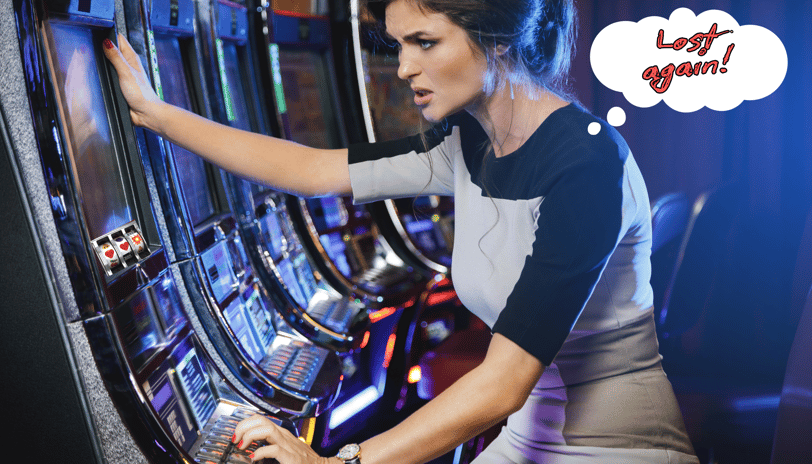Chasing the Love Jackpot: How Toxic Love Keeps You Playing to Lose
Love isn’t supposed to feel like gambling, yet many of us get hooked on unpredictable rewards in toxic relationships. Discover how intermittent reinforcement mirrors the allure of slot machines, why it’s so hard to walk away, and how to stop playing a game you can’t win.
RELATIONSHIPSTRAUMA & ABUSE
Tiffany
11/24/20243 min read


Intermittent Reinforcement: How It Traps You in Toxic Relationships
Have you ever wondered why it’s so hard to leave a toxic relationship, even when you know deep down it’s causing you harm? The answer often lies in something called intermittent reinforcement—a psychological phenomenon that explains why we get trapped in cycles of hope and disappointment, much like a gambler at a slot machine. Let’s explore how this works in abusive relationships and how to break free.
What Is Intermittent Reinforcement?
Intermittent reinforcement happens when rewards are given unpredictably, rather than on a consistent schedule. In relationships, this looks like periods of kindness, affection, or love mixed with times of neglect, manipulation, or abuse.
The unpredictability of when—or if—you’ll be rewarded keeps you hooked. It’s the same technique that makes slot machines addictive: you never know when you’ll win, so you keep trying, hoping for that next big payout.
How Toxic Relationships Mirror Slot Machines
In my last abusive relationship, I thought I had hit the jackpot. At first, there were big “wins”—a trip to Europe, fancy dinners, heartfelt declarations of love, and even moving in together. These rewards were intoxicating, especially after being love-bombed and influenced by people around me who encouraged the relationship.
But then, the “losses” started. Criticism, silent treatment, and emotional distance crept in. I clung to the hope that if I just tried harder, I could get back to the good times. The memories of our early wins—those souvenirs, photos, and shared dreams—kept me playing.
What I didn’t realize was that I was stuck in a game I couldn’t win. The rewards became less frequent and less predictable, and no matter how hard I tried to "play the right way," I couldn’t crack the code.
Why We Get Addicted
Like a gambler at a casino, people in toxic relationships often think, “Just one more try, and I’ll get back to the good times.” But just like the slot machine, the game is rigged. Narcissists and other abusive partners use intermittent reinforcement as a way to manipulate and control.
They cycle through periods of:
Positive reinforcement: Love-bombing, gifts, apologies, and affection.
Neglect and discard: Emotional withdrawal, criticism, gaslighting, or abuse.
This cycle is predictably unpredictable—it’s designed to keep you chasing the highs while tolerating the lows.
Signs You’re Trapped in Intermittent Reinforcement
Here are some red flags to help you recognize the cycle:
Unpredictable Rewards: You never know when your partner will be kind or loving.
Over-investment: You feel like you’ve put so much into the relationship that walking away feels impossible.
Hope Over Reality: You hold onto memories of the good times, even though the bad times outweigh them.
Self-Blame: You believe that if you just try harder, things will improve.
Emotional Highs and Lows: The brief moments of happiness are enough to keep you hooked, despite consistent hurt.
Breaking Free from the “Love Casino”
Walking away from an abusive relationship is harder than leaving a slot machine, but it’s possible. Here’s how to start:
1. Recognize the Pattern
Understand that the cycle of love-bombing and discard is manipulation, not love. No amount of effort on your part will change the cycle—it’s a game you can’t win.
2. Detach Emotionally
Start viewing the relationship objectively. Keep a journal to document the patterns of behavior. Over time, you’ll see how the losses outweigh the wins.
3. Prioritize Yourself
Shift your focus from pleasing your partner to taking care of your own needs. Invest in hobbies, friendships, and goals that make you feel valued.
4. Seek Support
You don’t have to go through this alone. Join a community of like-minded individuals who understand what you’re going through. For example, I created a Facebook group where people on similar journeys can connect and support each other.
5. Reject the “One More Try” Mentality
Remind yourself that even if you hit the “jackpot” again, the cost will always outweigh the reward. A healthy relationship doesn’t require endless tries or sacrifices to work.
The Hard Truth About the “Jackpot”
It took me a long time to realize that those big early wins were just a trap to keep me invested. I had become addicted to the “almost”—the hope that if I pushed the button just right, I’d get back to the good times. But I never did.
Eventually, I saw that the cost of staying was my happiness, my self-worth, and my future. I had to accept that no jackpot was worth losing myself.
Closing Thoughts
If you’re feeling trapped in a cycle of unpredictability, know that you’re not alone. Recognizing the pattern is the first step toward breaking free. Life outside the “love casino” may feel unfamiliar at first, but it’s where you’ll find true peace, freedom, and self-love.
You deserve more than almost. You deserve more than the unpredictable highs and lows. You deserve a life full of consistent love, respect, and joy.
Take that first step and walk away. The jackpot isn’t waiting in their arms—it’s waiting in yours.

